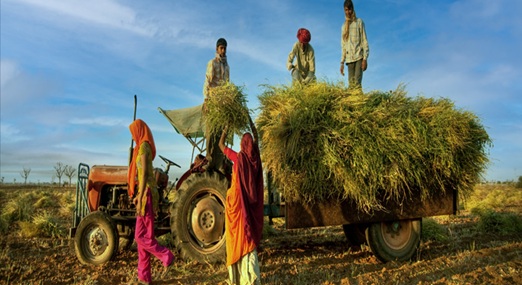(Prelims: Current Affairs)
(Mains, General Studies Paper 3: Storage, Transportation, and Marketing of Agricultural Produce, Related Issues and Barriers; E-Technology to Assist Farmers.) |
Context
NITI Aayog's Frontier Tech Hub in Gandhinagar, Gujarat, released a report titled "Reimagining Agriculture: A Roadmap for Frontier Technology-Led Transformation." This report presents a roadmap for making India's agricultural sector technologically empowered, sustainable, and inclusive by 2047.

About the Report
This report provides a strategic approach to increasing productivity, sustainability, and farmers' incomes by utilizing advanced technologies such as artificial intelligence (AI), IoT, drones, digital twins, agentic AI, and bio-innovation in India's agricultural system.
Key Objectives
- Increasing productivity and profitability through technology integration in agriculture.
- Developing tailored solutions for small and large farmers.
- Achieve the vision of a developed India 2047 by promoting sustainable agriculture.
A three-pillar framework
The report proposes three key pillars under the “Digital Agriculture Mission 2.0”:
- Data ecosystem development: Strengthen digital and data-driven decision-making in the agricultural sector.
- R&D and skills development: Promote research, innovation, and digital literacy of farmers.
- Policy and industry coordination: Accelerate agricultural transformation by combining industry knowledge and policymaking.
Farmer classification
The report categorizes India's farmers into three categories:
- Aspiring farmers (70–80%): Small farmers who need technical support and training.
- Transition farmers (15–20%): Those who are gradually adopting modern agriculture.
- Advanced farmers (1–2%): Farmers who use high-tech technologies on a commercial scale.
Current Agricultural Situation in India
- The agricultural sector employs 45.8% of the workforce and produces approximately 1 billion tons of food annually.
- Key Problems:
- 86% of farmers are smallholders, owning less than 1 hectare of land.
- Low mechanization and high costs.
- Post-harvest losses; an annual loss of approximately $18 billion.
- Limited access to digital and financial resources.
- Pressure on crop productivity due to climate change.
Opportunities in Frontier Technologies
- AI and Predictive Analytics: Accurate advisories for weather, disease, and crop forecasting, such as a 21% productivity increase in a pilot project in Telangana.
- Climate-resilient seeds: Drought, heat, and pest-resistant crops using gene editing technologies like CRISPR.
- Smart mechanization: Efficient resource utilization through drones, sensors, and digital twins.
- Blockchain: Transparency and security of farmer data from crop to consumer.
- Agritech Startups: 1,000+ Indian startups modernizing agriculture through AI and fintech.
Government Initiatives
- Digital Agriculture Mission (2021–25): Unified digital database of farmers.
- National Mission for Sustainable Agriculture: Promoting climate-smart farming.
- Kisan Drone Yojana: Crop spraying and mapping using drones.
- PM-KISAN and eNAM: Direct income support and digital agricultural markets.
- Agristack and Agri Accelerator Fund: Promoting startups and digital infrastructure development.
Key Challenges
- Data inconsistency: Data is misaligned across various systems.
- Lack of digital literacy: Small farmers lack trust in technology.
- Digital inequality: Lack of network and technical infrastructure in rural areas.
- Skills gap: Lack of coordination between agriculture and AI.
- Financial limitations: Lack of capital for technological innovations.
NITI Aayog's key recommendations
- Digital Agriculture Mission 2.0: Integrating AI-based advisories, digital twins, and startup accelerators.
- Research and innovation: Accelerating technology transfer from laboratories to farms.
- Agricultural talent development: Training farmers and youth in AI and digital skills
- Institutional collaboration: Coordinating policy, industry, and academia.
- Inclusive financial models: Increasing access to credit and insurance through alternative data.
Conclusion
This NITI Aayog report positions India towards an "Intelligent Agricultural Revolution," where data is the new soil and AI its nervous system. If policy, innovation, and inclusion are brought together, Indian agriculture can transform from traditional to tech-enabled, leading to balanced growth of productivity, sustainability, and prosperity.



